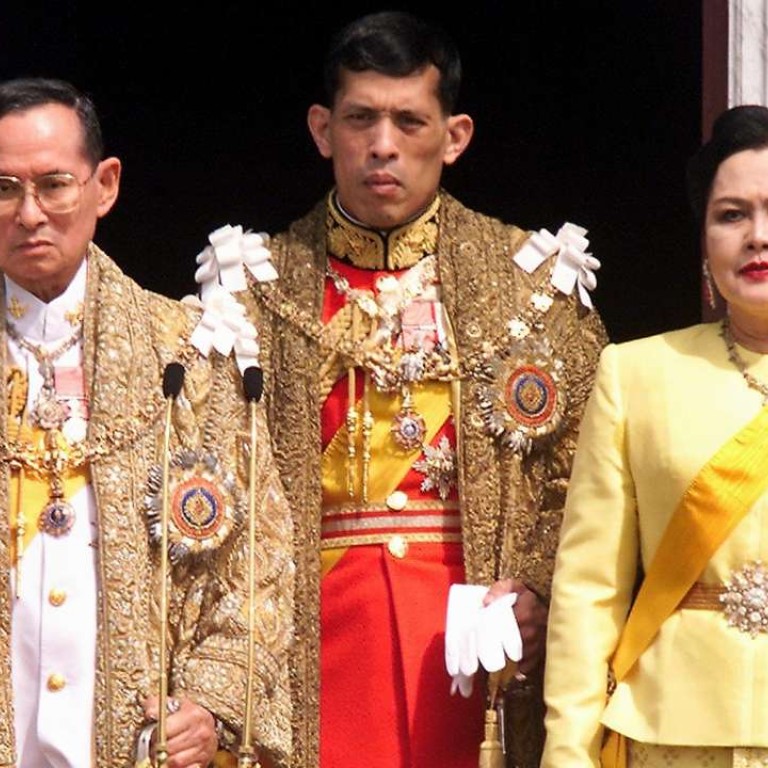
What next for Thailand, with the military left exposed and a crown prince lacking popular appeal?
Kevin Rafferty says the only way for the nation to realise its potential following the king’s death is by creating a culture of openness and challenging the entrenched elite
Thai king Bhumibol Adulyadej was not merely respected and revered, but virtually adored. His picture has a place of honour in almost every home, shop, office, factory and airport, and rises larger than life on public highways. His anthem is played before every cinema screening. “Father of the nation” conveys the feeling of ordinary Thais for their king, who died on Thursday, aged 88.
But for all the outpouring of grief, Thailand may come to rue the lost opportunities in a 70-year reign that failed to prepare for its ultimate end.
Thailand has enormous economic potential, as a fertile agricultural producer, promising industrial start-up, exporter of goods from electronics to pickup trucks, as well as a global tourist playground.
But, politically and socially, deep volcanic fault lines threaten its unity. The king’s death leaves the military exposed as de facto rulers, without a cloak of royal respectability to cover their shortcomings.

Thailand’s next king lives in shadow of revered father
Prime Minister Prayuth Chan-ocha said Crown Prince Maha Vajiralongkorn, 64, will succeed his father, but the only son of Bhumibol has asked for time to mourn. The king-to-be does not have the character, respect or healing quality of his father. Thrice divorced, he has been largely living in Germany with a former airline stewardess. Social media last year exploded when he ordered four-day Buddhist cremation rites for Air Chief Marshal Foo Foo, his 17-year-old poodle given full dress uniform.
Constitutionally, the king’s powers are limited, but Bhumibol exercised his great moral authority
Salacious stories abound about the prince, but are prevented from circulating in Thailand by strict lèse-majesté laws. Many influential Thais would have preferred his younger sister, Princess Maha Chakri Sirindhorn, regarded with great affection for her dedication to social issues, like her father.
Bhumibol’s reign started shakily, after the still unexplained death of his older brother, king Ananda Mahidol, found in his palace bedroom with a gunshot wound to his head. For the next four years until he came back to Bangkok and crowned himself king in 1950, Bhumibol mostly lived in Switzerland.
His finest years were from the 1950s to the 1980s, when he left the squabbling military and politicians behind to tour the country, starting projects from schools and clinics to drainage schemes, silk cultivation and weaving, and rainwater irrigation. Many Thais’ favourite picture of the king was not the formal robed one, but with pencil in hand and sweat dripping off his nose – the people’s king.
Constitutionally, the king’s powers are limited, but Bhumibol exercised his great moral authority; in the 1970s to stop the killings of student protesters, and again in 1992 when leaders of bloody street battles grovelled at his feet as he told them to stop.

A nation’s tears: Thai king was ‘like our father’
The royal court is no supreme moral being, however. The royal household, controlling billions of dollars in properties and corporate assets, is one of the major Bangkok elites, along with the military, the bureaucracy and wealthy business groups, playing grubby games of power.
By the 21st century, prospering Thailand had become too complicated for the old Bangkok elites to enjoy unfettered sway. Enter Thaksin Shinawatra, a police colonel who parlayed military connections and a business monopoly into a huge telecom empire. He then became a politician and exposed the divisions between Bangkok and Thailand’s poor hinterland. Critics claim he bullied, bribed and bought up democracy on the road to becoming prime minister, though Bangkok and much of the south remained loyal to the old Democrat Party.
Ousted by a coup in 2006 while abroad, Thaksin still managed to exert his influence from exile from 2011 to 2014 through his sister Yingluck, who was prime minister until she was removed by Prayuth’s coup. More dangerously, Thaksin’s red-shirt loyalists were prepared to challenge the yellow shirts of the old establishment in battles on the streets.
‘If he asked us not to fight, we would not fight’: Thais in Hong Kong mourn death of beloved monarch
Prayuth prepared for the death of Bhumibol by devising a new constitution that gives the military entrenched powers to prevent Thaksin or a like-minded populist from being voted into power. After all, a ruthless man like Thaksin might try to cut a deal with a prince in his desperation to regain power, and indeed there were rumours of such a deal.
Thailand will pay the price for the generals’ fear of their people
But there are flaws in Prayuth’s defences. Many of the 20 coup attempts littering Bhumibol’s reign were triggered by disgruntled military factions or rivalries between generals. Modern Thailand is too complex to be run by simple-minded generals, even if they can keep from plundering public finances.
If Thailand is to build on its immense natural resources and talent, it needs more openness, more questioning, and a better education system to encourage entrepreneurial flair and to challenge the entrenched elites. Young Bhumibol seemed to understand this, but in his ailing later years he retreated to a distant demigod status with ceremonial robes and flunkies who had vested interests in not talking truth to power. Thailand will pay the price for the generals’ fear of their people.
Kevin Rafferty edited a daily newspaper in Thailand when Thaksin was prime minister until he was threatened with imprisonment for interviewing an opposition economist

